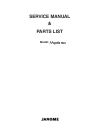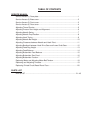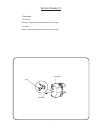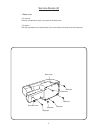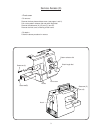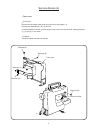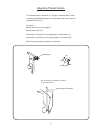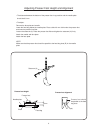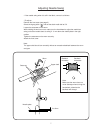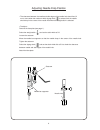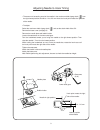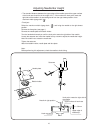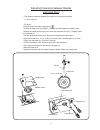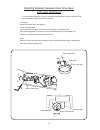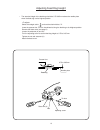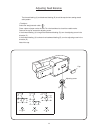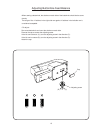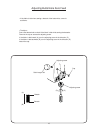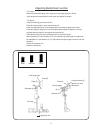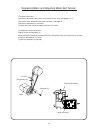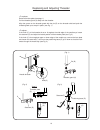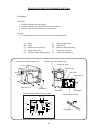Summary of Magnolia 7325
Page 1
Model: service manual & parts list.
Page 2
Service manual service access (1) face plate .....................................................................................1 service access (2) base cover ...................................................................................2 service access (3) front cover .........................
Page 3
1 setscrew face plate service access (1) cap • face plate remove the cap and setscrew. Remove the face plate. Attach the face plate with the setscrew. Attach the cap..
Page 4
2 service access (2) remove the setscrews (6 pcs.) and remove the base cover. Shift the drop feed lever in the direction of the arrow. Attach the base cover with setscrews. • base cover setscrew setscrew setscrew base cover setscrew setscrew setscrew drop feed lever.
Page 5
3 service access (3) hook setscrew (c) (two off) remove the face plate and base cover (see pages 1 and 2). Pull out the pattern selector dial and stitch length dial. Remove the setscrews (a), (b) and (c) (two off). Remove the front cover, unlocking all the hooks. Follow the above procedure in revers...
Page 6
4 service access (4) • rear cover to remove> remove the face plate, base cover and front cover (see pages 1-3). Remove the setscrews (a), (b), (c) and (d). Lower the presser foot lifter and pull away the rear cover from the machine, clearing the parts (1), (2) and (3), in this order. Follow the abov...
Page 7
5 adjusting thread tension • the standard tension should be 75 - 90 grams measured with a white polyester thread #50 being pulled in the direction of the arrow, when the tension dial is set at "4". Remove the front cover (see apge 3). Set the tension dial at "4". If the tension is too tight, turn th...
Page 8
6 adjusting presser foot height and alignment • the distance between the bottom of the presser foot in up position and the needle plate should be 6.0 mm. Remove the face plate and needle. Lower the feed dog below the needle plate. Place a block 6 mm thick under the presser foot and lower the presser...
Page 9
7 adjusting needle swing • if the needle swing when it is still in the fabric, correct it as follows. Remove the front cover (see page 3). Select the zigzag stitch ( ) and set the stitch wodth dial at 5.0. Loosen the setscrews on the worm. While holding the worm as not to rotate, turn the handwheel ...
Page 10
8 adjusting needle drop position • the clearance between the needle and side edges of the needle hole should be 0.2 mm or more when the maximum width zigzag stitch ( ) is selecte. And the neddle should drop in the center of the needle hole when the straight stitch is selected. Remove the face plate ...
Page 11
9 adjusting needle to hook timing • the amount of ascending travel of the needle in the maximum width zigzag stitch ( ) from the right lowest position should be 1.4 to 2.0 mm where the hook point meets the right side of the needle. Select the maximum width zigzag stitch ( ) and set the stitch width ...
Page 12
10 adjusting needle bar height • the standard distance between the upper edge of the needle eye and the upper surface of the hook race should be in the range of 3.0 - 3.6 mm when the hook point meets the right side of the needle in its ascending travel from the right lowest position of the maximum w...
Page 13
11 adjusting clearance between needle and hook point • the standard clearance between the needle and hook point should be -0.10 to +0.05 mm. Select the maximum width zigzag stitch ( ). Remove the base cover (see page 2). Remove the needle plate and bobbin holder. Replace the needle with the test pin...
Page 14
12 adjusting backlash between hook drive gear and lower shaft gear • the rotary play should be 0.8 mm or less when the hook point is within the span of the feed dog, and the gears should turn smoothly. Remove the base cover (see page 2). Loosen the setscrews. If the backlash is too big, turn the low...
Page 15
13 adjusting feed dog height select the straight stitch ( ) and set the stitch width at "4". Lower the presser foot. Turn the handwheel to bring the feed dog to its heighest position. Remove the base cover (see page 2). Loosen the setscrew (a) and nut. Turn the adjusting screw to set the feed dog he...
Page 16
14 adjusting feed balance a a b 1 2 3 a a 1 2 3 b a a 1 2 3 b a b a b a b the forward feeding (a) and backward feeding (b) should be equal when sewing stretch stitch pattern. Select the straight stretch stitch ( ). Place a piece of paper under the foot. Turn the handwheel to check the needle marks. ...
Page 17
15 adjusting buttonhole feed balance (c) (d) (a) (b) cap adjusting screw • when sewing a buttonhole, the stitches on each side of the buttonhole should be the same density. The range of 9 to 12 stitches in the right side row against 10 stitches in the left side row is considered acceptable. Sew a te...
Page 18
16 adjusting buttonhole zero feed • if the fabric is fed when sewing a bartack of the buttonhole, correct it as follows: sew a test buttonhole to check if the fabric is fed while sewing the bartacks. Remove the cap to access the adjusting screw. If the fabric is fed foward (a), turn the adjusting sc...
Page 19
17 adjusting buttonhole function short standard long buttonhole should be about 3mm longer than the length set by the r foot. If this length cannot be obtained, then check and adjust as follows: lower the feed dog and set the r foot. Remove the face plate. Loosen the setscrew (a). Lower the buttonho...
Page 20
18 motor connector circuit board b case replacing motor and adjusting motor belt tension remove the face plate, base cover, front cover and rear cover (see pages 1 to 4). Remove the case, disconnect the motor connector. (see page 20). Remove the setscrews (c) and motor. To attach the motor, follow t...
Page 21
19 needle threader x replacing and adjusting threader remove the face plate (see page 1). Pull the threader guard (a) away from the threader. Align the groove on the threader guard with the pin (b) on the threader shaft and push the threader guard up to snap it in place. (see fig. 1). If the hook (c...
Page 22
20 replacing printed circuit board b and fuse to replace: to remove: 1. Remove the base cover (see page 2). 2. Remove setscrews (a). Remove the case and connectors. 3. Remove setscrews (b). Remove the circuit board b. To attach: 4. To attach the printed circuit board b, reverse the procedure above. ...

